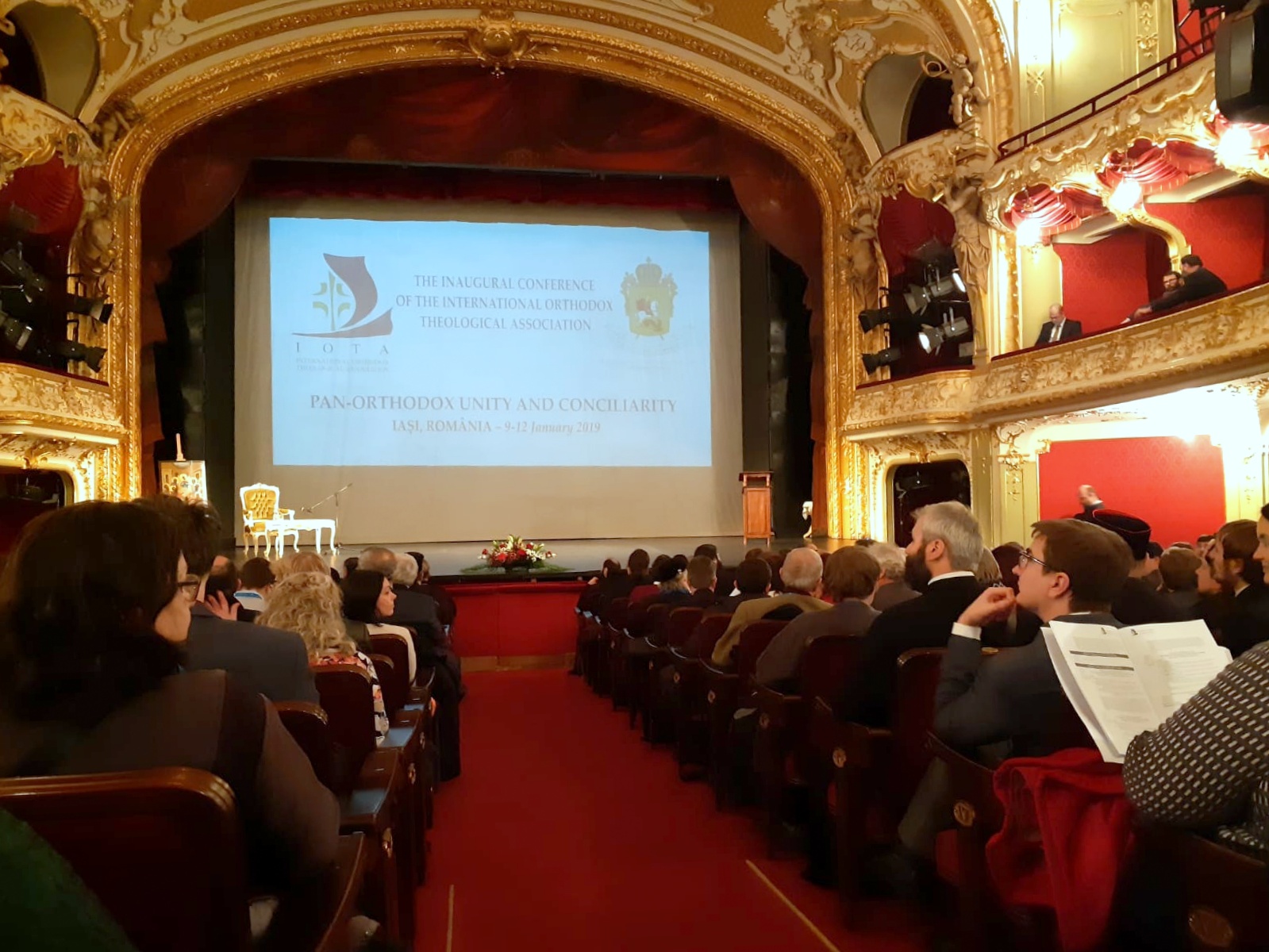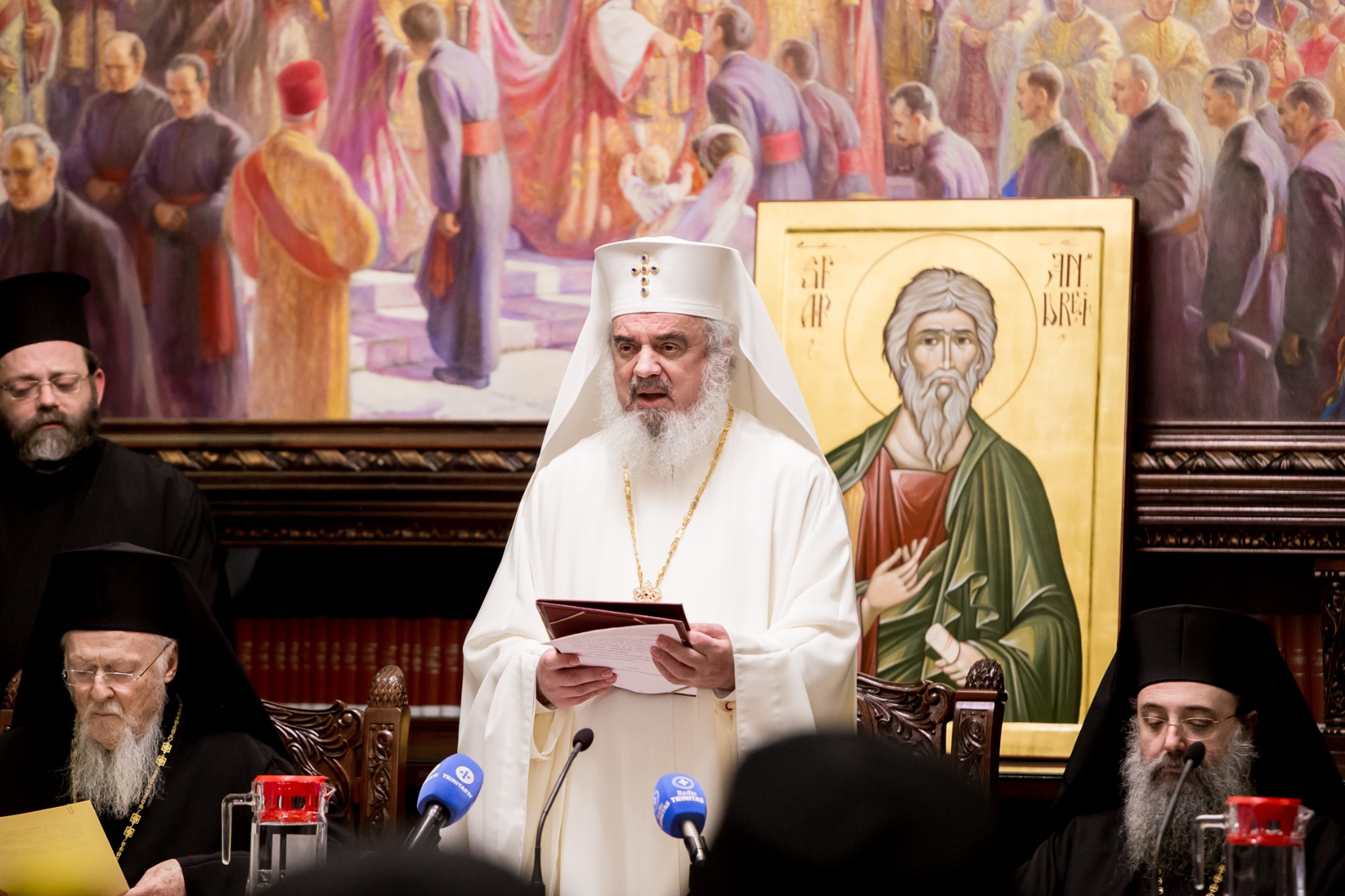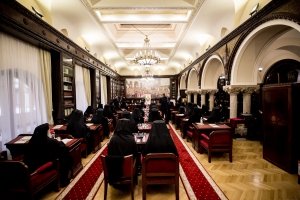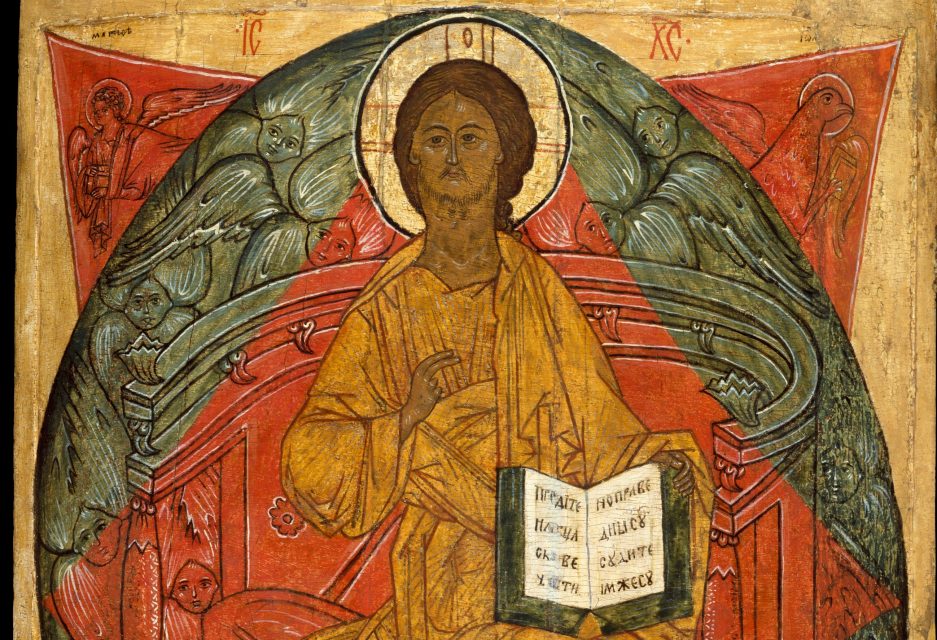Englewood Review of Books has recently published my brief review of the recently translated work of Olivier Clément, “Transfiguring Time: Understanding Time in the Light of the Orthodox Tradition”.
The Trap in the Tomos
Another important analysis of the situation in Ukraine and the route through which autocephaly should be proclaimed. In some key points this echoes some of Fr John’s earlier thoughts…
As the holy synods of the local Orthodox churches deliberate whether or not accept the Patriarchate of Constantinople’s decision to create an autocephalous church in Ukraine, the character of the text newly-issued tomos may prove decisive in their decisions. While very few, if any, churches appear to be opposed to the idea of an autocephalous Ukrainian Orthodox Church in principle, they may very well oppose the manner in which it was granted and the document granting it. This is because the tomos, as a canonical document, not only grants autocephaly but attempts to define the very nature of autocephaly and assert Constantinople’s vision of its primatial relationship with the other churches. Orthodox hierarchs must read the document carefully and discerningly in order to identify any traps that may have been laid for them in it. In the absence of a conciliar decision, to accept the tomos is to accept the…
View original post 1,364 more words
Ukrainian Autocephaly: A Vision of the Future? – from Fr. John Cox

Fr. John Cox has just posted a series of reflections on the ramifications of the tomos given by the Ecumenical Patriarch to the newly organized church in Ukraine.
Pan-Orthodox Synodality: Looking at Patriarch Daniel’s Recent IOTA Address

It pains me to say that I am missing International Orthodox Theological Association’s inaugural conference, entitled “Panorthodox Unity and Synodality”. I had a paper accepted, discussing the Council of Crete, which I may soon share the basic gist of in a forthcoming blog, but due to family, travel expenses, lack of institutional support (aka not in a Phd program), and other factors I decided I couldn’t make it…
While I lament this reality, lo and behold Basilica.ro, the news agency for the Romanian Patriarchate, has just published the address of His Beatitude Daniel, Patriarch of Romania, to the inaugural conference of IOTA.
It is a short document that underlines the vision of his Beatitude, a vision I believe that needs to be made more clear and accessible in the complex ecclesiastical and canonical challenges facing the Orthodox Church today. I am especially thinking of the past Council of Crete and the current debacle regarding Moscow and Constantinople in regards to autocephaly in Ukraine. These issues are for most people pretty abstract, overly complicated, and generally lead to a lot of assertions that claim to be rooted in the canons or the canonical tradition. I am highlighting Patriarch Daniel’s short address because it brings into focus an Orthodox primate’s ecclesial vision that comes from outside of Constantinople or Moscow. I want to highlight this in order to provide a broader context, a different rationale, and bibliographical information so that others may see the broader Orthodox theological and ecclesiastical landscape. I could easily look to the work of Bishop Maxim Vasiljević.
Patriarch Daniel believes that the renewal of Orthodox theology in today’s world is paramount for the Church. Paramount because it is incumbent upon the Church to respond to and engage with contemporary challenges, especially the challenge of secularism (more on Patriarch Daniel’s thinking on secularism in a later post). Key in this renewal will be the understanding of and manifestation of the unity of the Church. The unity of the Church is not just an administrative aspect for his Beatitude, rather, it is of “permanent concern” for the theological, spiritual, and pastoral realities of the Church.
Here we may have expected an exposition of the creedal attributes of the Church, specifically her unity, holiness, catholicity, or apostolicity. Instead we find this:
“…synodality is a canonical rule and a practice in the life of the local Orthodox Churches in order to express the unity of the Orthodox faith, of the sacramental life, and of the canonical discipline, according to the Holy Scripture and the Holy Apostolic and patristic tradition.”
His Beatitude emphasizes the necessary practice of synodality. This means the rule and ancient practice of the Church being governed by a synod of bishops and a primate. The centrality of synodality to the understanding of the Church is reflected in the famous comment by St. John Chrysostom, ‘”Church” means both gathering [systema] and synod [synodos]”(Explicatio in Ps 149 (PG 55, 493)). In the mind of the Fathers of the Church, and obviously enshrined within the Ecumenical Councils and possibly as far back as the gathering in Jerusalem found in the Book of Acts (a disputed point, but beyond our purview here), the functioning of episcopal synods are essential to the unity of the Church. Further, according to his Beatitude, it is a “permanent canonical norm”. Synodality is how the Orthodox Church lives, breathes, and makes its decisions as a unified body.
If this is true, how can we truly operate and cooperate on a global level if not through the practice of synodality? Crete was a small peek of what possibly could be. But it would need to be followed by more Pan-Orthodox activity. Like any practice we must do it repeatedly and purposefully for it to become a habit.

His Beatitude’s argument continues by extrapolating from the permanent canonical norm of synodality at the local level to the need for the permanent practice of synodality at the “panorthodox or universal level”. Why? Well, think of the many standing canonical, pastoral, missional, and ecclesiological challenges facing the Orthodox Church today. A standing Pan-Orthodox synod would not convene for crisis management or as simply an expensive and tardy backup plan. Rather, Patriarch Daniel insists that a standing Pan-Orthodox synod should be a permanent practice in order to assert ecclesial communion and the “pastoral and missionary co-responsibility of Orthodoxy in today’s world”.
According to Patriarch Daniel, the ultimate roots of and framework for synodality are found in the Holy Trinity, who is the “source, model and purpose of panorthodox unity and synodality in the Church”. This echoes points he has made for the past few decades. For example, see his speech, “Significance of the Trinitarian Theology for the Life and the Mission of the Church,” or the chapter “Exploring the Mystery of the Undivided Church: The Calling of Trinitarian Love Today” found in Daniel Ciobotea, Confessing the Truth in Love: Orthodox Perspectives on Life, Mission, and Unity, (Bucharest: Basilica, 2008). The other major point that Patriarch Daniel makes in his address I would like to later revisit. That theme being the necessity of dogmatic theology and dogmatic theology’s need to explicate the “common inheritance” in order to serve and aid in the salvation of the Church’s faithful. Patriarch Daniel highlights the thoughts of Fr Dumitru Staniloae regarding dogmatic theology as eminently important for theological education today. This is one of the basic themes I would like to attend to on this blog on a regular basis.
For the context of IOTA’s conference Patriarch Daniel focuses on particular ecclesial needs with which contemporary theological reflection should be concerned. More specifically, Patriarch Daniel provides a small outline of basic “dialectics” within Orthodox ecclesial life:
- the relationship between individual freedom and ecclesial communion
- between academic theology and the life of parishes and monasteries
- between primacy and synodality, at local and panorthodox levels
- between local autocephaly and panorthodox co-responsibility
These themes are of course necessary to address to a congress of academic theologians. Elsewhere, Patriarch Daniel has written beautifully on the need to confess Christ in the contemporary world and to think through contemporary social, moral, and political challenges from a theological perspective (yet again, to be the subject of a future post).
In conclusion, Patriarch Daniel makes a plea for vigilance and dialogue.
“Dialogue, mutual consultation and concrete cooperation between our autocephalous Churches must become a permanent, well-organised practice, not just isolated or conjectural events. We must constantly be vigilant so that individual or collective egotism should not undermine the holiness of ecclesial communion.”
Underlining the need for vigilance regarding our ego is not just political parlance. This emphasis should open our eyes to the ascetical effort and spiritual maturity needed for real, honest, and sincere dialogue to take place. Why would we expect things to run well in world Orthodoxy if we do not actually practice dialogue within synod on a regular basis? Should it not be considered a spiritual practice for us to vigilantly and rationally organize ourselves, dialogue among ourselves, and seek to preserve the unity of God’s household? Again, how can we maintain the bond of peace and unity without ever having to exercise the practice of dialogue? (I am especially thankful to Fr Nicolas Kazarian for this insight).

The vision of Patriarch Daniel for a standing Pan-Orthodox Synod is also that of the synod of Romania. For example, see this recent statement by the synod of Romania in response to the issue of autocephaly in Ukraine. For further work of the Romanian synod, see this pamphlet concerning common questions around the recent Council of Crete. I believe it is not only this vision, but the particular theological and spiritual formation of Patriarch Daniel, a product of the tutelage of Fr Dumitru Staniloae and Elder Cleopa, that led to this reflection by Metropolitan Vlachos about the leadership of Romania, and specifically Patriarch Daniel at Crete, and this article by Victor Gaetan.
A serious question for the Orthodox Church is the challenge and need to begin practicing synodality at a universal level. His Beatitude underlines for us that the permanent practice of a Pan-Orthodox Synod is an ecclesiological, missional, and pastoral necessity. How else will we fix the ecclesiological mess that we have in all historically non-Orthodox places?
—
Wondering about Pan-Orthodox Synodality?
Here is a short bibliography to explore this further:
Classics:
The Challenge of Our Past by Fr John Erickson
Catholicity and the Church by Fr John Meyendorff
More recent works:
Primacy in the Church: The Office of Primate and the Authority of Councils (2 Volume Set)
Bishop Maxim’s chapter: “Synodality: A Misinterpreted Vision” from above book.
Re-Entering the Blogosphere

Over the years I have created various iterations of blogs. From tumblr like blogs to full blown entries on various theological topics. And, from what I hear, the reign of blogs have long passed. Podcasts are dominant.
So, why blog? And, why now?
Here’s a list from off the top of my head as to why I am going to attempt re-entering the blogosphere…
- Create a platform to write and think aloud about theological and ecclesial issues that I think on often.
- Hopefully create some dialogue around theological issues, especially concerning Orthodox theology. An earlier iteration of this was a group effort around the theological vision of Florovsky and Staniloae.
- There are quite a few Orthodox theological blogs which actually delve into substantive theological matters. For example: Seraphim Hamilton, Sam Noble, Dn Aaron Taylor, Fr Jonathan Tobias, Orthodoxy and Heterodoxy, Fr Esteban Vázquez, Fr Stephen Freeman, Fr Aidan Kimel, Fr Stephen De Young, and Dr Nicole Roccas (if you know of more I should be reading let me know!), but I think, considering my history and formation, that there are some specific and different angles that I could provide.
- Share the work and basic influence of the late Fr Matthew Baker, a dear friend of mine. This will be through working through a few of his key publised essays and pointing out where his thought was directing us. Some of his basic instincts and work are still basic to my theological convictions.
- There are not many Orthodox theological blogs which attempt to deal with Orthodox systematic / dogmatic theology in a broad format. Yes, posts here and there which tackle a particular theological point. But I am unaware of a blog which asks theological questions about Orthodox homiletics, pastoralia, hermeneutics, ecclesiology, canon law, mission, Scripture, catechesis, etc.
Why now?
- Having been newly ordained to the holy presbyterate in the Orthodox Church I am engaging and wrestling with these issues from a different perspective. I have also had the luxury of recently leaving seminary where I had freedom to begin to work on some of these topics.
- I was recently gifted a Chromebook, so I have the luxury of a blogging computer that does not impigne upon our other computer….
So, hopefully you will return at some point and there will be some content here for you!
